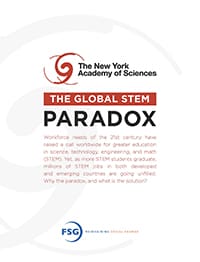Despite increasing numbers of science, technology, engineering, and math (STEM) graduates worldwide, STEM jobs remain unfilled in developed and developing countries. Through an exploration of the root causes of this global STEM paradox, FSG offers an answer to this growing crisis: a strong STEM ecosystem supported by enabling government policies, business incentives, and cultural attitudes.
Top Takeaways
- While there are greater numbers of STEM graduates worldwide than ever before, STEM jobs remain unfilled in a phenomenon termed the global STEM paradox.
- Four underlying causes contribute to the global STEM paradox: a shortage of graduates with soft skills, a lack of qualified technicians, a loss of high-skills workers, and untapped pools of talent.
- A strong STEM ecosystem of enabling government policies, business incentives, and cultural attitudes offers a solution to the global STEM paradox and would create the essential components for countries to realize increased economic growth and improved competitiveness.



